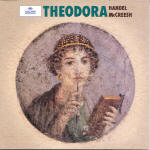Handel’s Theodora remains one of his least known oratorios. A late work, he reputedly valued it highly despite the public’s cool reception on its initial run. Just how important the piece was to him personally, as opposed to financially, we will never know, but it did give rise to one of the very best Handelian one-liners that has come down to us: “The Jews will not come to it (as to Judas) because it is a Christian story, and the ladies will not because it is a virtuous one.” Whatever the truth, we can be reasonably sure that as one of the very few of Handel’s oratorios on a Christian theme, Theodora would have been close to his heart. Certainly there’s no musical reason to account for its comparative neglect: it’s first rate Handel throughout.
The story has some remarkable similarities to Poulenc’s Dialogues of the Carmelites, concerning as it does a Christian community oppressed (by the Romans in this case) and forbidden to freely express their faith. For defying the Roman ban, Theodora gets sentenced to servitude in a brothel (punishment juicy enough to attract at least some of the ladies, one would think). Her boyfriend Didymus, a Roman soldier and closet Christian, contrives to spring her from jail/sexual servitude, for which crime he is condemned to die. Overcome with guilt, Theodora offers herself in his place, a deal rejected by the Roman general Valens who instead orders them both executed. The pair then very Christianly looks forward to immortality together.
Paul McCreesh’s performance attains the high standard that we have come to expect from previous issues in his Handel series; he’s at least as good as the competition on Harmonia Mundi, and both Susan Gritton’s Theodora and Susan Bickley’s Irene (her fire-breathing companion) have a great time with their respective roles. As Didymus, Robin Blaze sounds less annoying than many of his ilk, though I will never understand the fashion for countertenors considering the fact that Handel never wrote a single major role for one. They are not an appropriate substitute for a Handelian castrato; Marilyn Horne is a substitute for a Handelian castrato, and although the composer would use them when he had no choice (on religious occasions where female participation was forbidden, for example), he had no qualms about using female singers when a great castrato was unavailable. Tone and technique mattered most. Blaze has technique, but tone? Well, that’s a matter of taste, and this is the way it’s done nowadays.
In any event, don’t let my little rant put you off this magnificent work. The Gabrieli Consort and Players offer fine playing, there are some rousing choruses (check out Part Two’s “He Saw the Lovely Youth”), and the story really does have an operatic sort of pacing. There’s nothing static or dull about it, and if Handel himself valued the work so highly, why shouldn’t we?
































